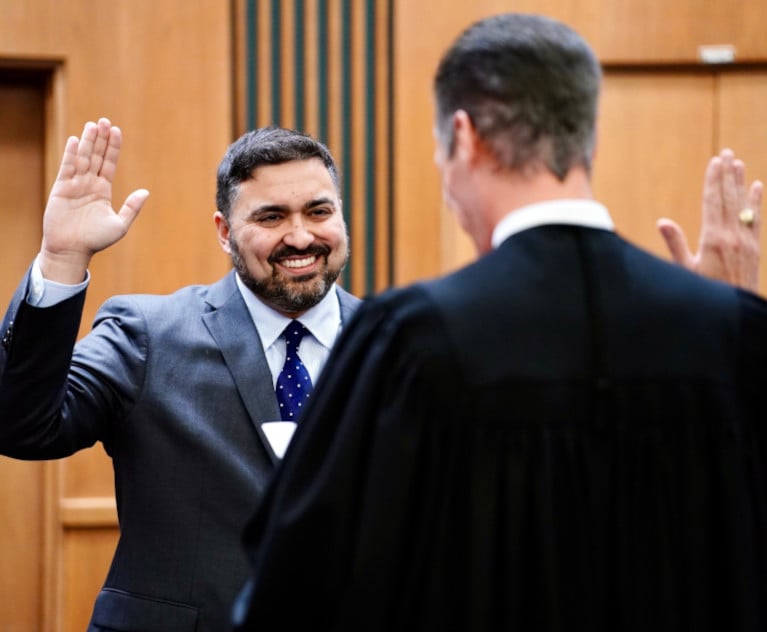Wrongfully Convicted Ex-Judge Wins Ruling in Malicious Prosecution Lawsuit
The judge found the DA's prosecutors “were acting as investigators searching for probable cause, as opposed to acting as prosecutors with probable cause preparing for prosecution. As such, at this time, prosecutorial immunity does not protect the actions.”
March 28, 2019 at 05:13 PM
6 minute read
 Suzanne Wooten. Photo: Mark Graham
Suzanne Wooten. Photo: Mark Graham
A former Texas district judge who was wrongfully convicted of nine felonies and later acquitted—because the allegations against her broke no Texas law—has moved a step closer to holding prosecutors accountable for alleged malicious prosecution.
Judge Amos Mazzant of the U.S. District Court for the Eastern District of Texas ruled yesterday that the prosecutors who investigate and prosecuted former 380th District Judge Suzanne Wooten of Collin County cannot claim that prosecutorial immunity protects them because they acted as detectives, rather than just prosecutors.
“This was not a case where the police investigated a crime to find a suspect, but rather where the prosecutors investigated a suspect to find a crime,” wrote Mazzant in the March 27 opinion in Wooten v. Roach, which denied all but one argument in the defendants' motions to dismiss Wooten's lawsuit.
The defendants are Collin County, its former District Attorney John Roach Sr. and former Assistant District Attorney Christopher Milner, former Texas Attorney General Greg Abbott—he's now Texas governor—and former Assistant Attorney General Harry White. White and Abbott's press office didn't respond to a request for comment. Matthews, Shiels, Knott, Eden, Davis & Beanland partner Bob Davis of Dallas, who represents Collin County, Roach and Milner, declined to comment.
Wooten's lawyer, Scott H. Palmer, said she feels elated by the ruling.
“She understands there's probably more to come,” said Palmer, president of Scott H. Palmer PC in Addison. “These guys did this on their own: They targeted her and took this on lock, stock and barrel, and investigated their own case. That's not what prosecutors do normally. It sends a message to prosecutors across the state and the land: Don't engage in this type of behavior, because if you do and it blows up in your face, you are going to get sued.”
Wrongful Conviction
The opinion explained the background of the case. In March 2008, Wooten defeated incumbent 380th District Judge Charles Sandoval in the Republican primary in Collin County. Sandoval filed a complaint against Wooten, alleging she cheated during the election. The DA's office, headed by Roach at the time, investigated Wooten's campaign without law enforcement's help. Later, the AG's Office joined the prosecution. The two-year investigation ended with Wooten indicted in October 2010, and re-indicted in July 2011.
The prosecution's theory was that a married couple, David and Stacy Cary, gave contributions to Wooten's campaign through James Spencer, Wooten's campaign consultant, who also did consultant work for the Carys. The central allegation was that the Carys funneled money through Spencer to Wooten's campaign, in exchange for Wooten to file to run as a judge, campaign against Sandoval and issue favorable rulings in the Cary family law cases, Texas Lawyer reported.
The Carys and Spencer became co-defendants in Wooten's case, and each was tried separately and convicted by juries. As for Wooten, she faced convictions for six counts of bribery, one count of engaging in organized criminal activity, one count of money laundering and one count of tampering with a government record, the opinion said.
Texas Lawyer previously reported that in the end, a jury convicted Wooten of the nine felonies in November 2011, and the state offered her 10 years of probation if she would resign and waive her right to appeal. She accepted but still pleaded not guilty and never waived her right to habeas corpus relief. She was sentenced to 10 years of probation and a $10,000 fine.
Mazzant wrote that Spencer took a plea deal. The Carys appealed their convictions, and eventually, those appeals wound up in the Texas Court of Criminal Appeals, which in December 2016 acquitted the Carys of all counts, ruling the allegations against them weren't a crime under Texas law.
Using that reasoning, Wooten filed for habeas corpus relief and won her acquittal in May 2017. She had been disbarred because of her conviction, but upon her acquittal, Wooten won back her law license.
Malicious Prosecution Lawsuit
Wooten in May 2018 sued the prosecutors and county for violations of due process, violations of the Fourth Amendment, conspiracy to deprive constitutional rights, malicious prosecution and more.
In motions to dismiss, the prosecutors argued that prosecutorial immunity would protect them from the lawsuit. But Mazzant explained there's a difference between a prosecutor's role investigating a case to prepare for trial, and a detective's role in investigating a case to find probable cause for an arrest.
Mazzant wrote that the DA's prosecutors “were acting as investigators searching for probable cause, as opposed to acting as prosecutors with probable cause preparing for prosecution. As such, at this time, prosecutorial immunity does not protect the actions.”
White, the assistant AG who prosecuted Wooten argued that his office intervened in the case after the investigation phase wrapped up. Mazzant disagreed, noting that White came in the case in December 2008, when prosecutors hadn't even found probable cause and were nowhere close to having enough evidence for an indictment, much less ready to try the case.
Wooten also claimed Collin County had a policy of wrongful arrests and prosecutions without probable cause or due process. The county argued it shouldn't face liability because it didn't control Roach's arrests and prosecutions, and he was acting on behalf of the state, not the county. But Mazzant explained that voters in a county elect a DA, and the county pays for the office's operations, so district attorneys do sometimes act as county-level policymakers. Wooten's allegation about Roach's policy, if true, would break state and federal law, wrote the court. Mazzant found that Roach was acting as a policymaker for the county.
The court did grant one argument for the county, which claimed Wooten can't recover punitive damages against it. Because Wooten didn't respond to the argument, case law says there's a presumption she doesn't oppose the County's facts, or doesn't have evidence to oppose the argument. Therefore, Mazzant approved the county's motion to dismiss the punitive damages claim against it.
This content has been archived. It is available through our partners, LexisNexis® and Bloomberg Law.
To view this content, please continue to their sites.
Not a Lexis Subscriber?
Subscribe Now
Not a Bloomberg Law Subscriber?
Subscribe Now
NOT FOR REPRINT
© 2025 ALM Global, LLC, All Rights Reserved. Request academic re-use from www.copyright.com. All other uses, submit a request to [email protected]. For more information visit Asset & Logo Licensing.
You Might Like
View All


Trending Stories
Who Got The Work
J. Brugh Lower of Gibbons has entered an appearance for industrial equipment supplier Devco Corporation in a pending trademark infringement lawsuit. The suit, accusing the defendant of selling knock-off Graco products, was filed Dec. 18 in New Jersey District Court by Rivkin Radler on behalf of Graco Inc. and Graco Minnesota. The case, assigned to U.S. District Judge Zahid N. Quraishi, is 3:24-cv-11294, Graco Inc. et al v. Devco Corporation.
Who Got The Work
Rebecca Maller-Stein and Kent A. Yalowitz of Arnold & Porter Kaye Scholer have entered their appearances for Hanaco Venture Capital and its executives, Lior Prosor and David Frankel, in a pending securities lawsuit. The action, filed on Dec. 24 in New York Southern District Court by Zell, Aron & Co. on behalf of Goldeneye Advisors, accuses the defendants of negligently and fraudulently managing the plaintiff's $1 million investment. The case, assigned to U.S. District Judge Vernon S. Broderick, is 1:24-cv-09918, Goldeneye Advisors, LLC v. Hanaco Venture Capital, Ltd. et al.
Who Got The Work
Attorneys from A&O Shearman has stepped in as defense counsel for Toronto-Dominion Bank and other defendants in a pending securities class action. The suit, filed Dec. 11 in New York Southern District Court by Bleichmar Fonti & Auld, accuses the defendants of concealing the bank's 'pervasive' deficiencies in regards to its compliance with the Bank Secrecy Act and the quality of its anti-money laundering controls. The case, assigned to U.S. District Judge Arun Subramanian, is 1:24-cv-09445, Gonzalez v. The Toronto-Dominion Bank et al.
Who Got The Work
Crown Castle International, a Pennsylvania company providing shared communications infrastructure, has turned to Luke D. Wolf of Gordon Rees Scully Mansukhani to fend off a pending breach-of-contract lawsuit. The court action, filed Nov. 25 in Michigan Eastern District Court by Hooper Hathaway PC on behalf of The Town Residences LLC, accuses Crown Castle of failing to transfer approximately $30,000 in utility payments from T-Mobile in breach of a roof-top lease and assignment agreement. The case, assigned to U.S. District Judge Susan K. Declercq, is 2:24-cv-13131, The Town Residences LLC v. T-Mobile US, Inc. et al.
Who Got The Work
Wilfred P. Coronato and Daniel M. Schwartz of McCarter & English have stepped in as defense counsel to Electrolux Home Products Inc. in a pending product liability lawsuit. The court action, filed Nov. 26 in New York Eastern District Court by Poulos Lopiccolo PC and Nagel Rice LLP on behalf of David Stern, alleges that the defendant's refrigerators’ drawers and shelving repeatedly break and fall apart within months after purchase. The case, assigned to U.S. District Judge Joan M. Azrack, is 2:24-cv-08204, Stern v. Electrolux Home Products, Inc.
Featured Firms
Law Offices of Gary Martin Hays & Associates, P.C.
(470) 294-1674
Law Offices of Mark E. Salomone
(857) 444-6468
Smith & Hassler
(713) 739-1250







